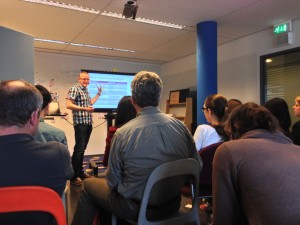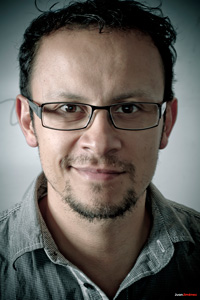Lab-Talk July 1st – 2013
“Internet of things” by Chris Speed
In his talk, Chris will reflect upon the temporal characteristics of the emerging phenomenon known as the “Internet of Things”. As objects become individually tagged with unique identities through the addition of small electronic chips or bar codes, their history is recorded and made available to others across a network. The advent of this ever- growing catalogue of histories and connections means that every object will require a firewall around it to stop people placing stories and information upon it. This means that objects in shops, museums and households are likely to be ‘hacked’ by shoppers, visitors and family members suggesting that owners will lose control of what a particular artefact means in a collection.
The venue of this LabTalk is special: the Joost van der Grinten hall !!! LabTalks grow aiming to reach a wider audience.
When: Monday July 1st
Time: 16:00 -17:00
Where: Joost van der Grinten hall
Lab-Talk June 25th – 2013
“We Love, therefore We loss” by Lavender She (Wan Jou She)
In her presentation, Lavender describes loss as a highly inevitable and individual experience in life and how this event can influence to our subjective well being and self-identity: “We Love, therefore We loss“: “Loss is a highly inevitable and individual experience in our life. It is often resulted from our attachment (or love) to a specific figure or object which we relate our security and identity to. Intensive loss events such as losing a partner, being unemployed or undergoing amputation can bring vast influence to our subjective well being and self identity. In my presentation, I will give a brief introduction of my inspiration of doing loss research and my future design approach to loss coping and loss resilience”.
Lavender She is a PhD candidate at IO Faculty, Delft Institute of Positive Design.
Lab-Talk June 24th – 2013
Provotypes of a Digital Soapbox: New Contributions by Interaction Design to Situated Civic Discourse” by Leonardo Parra
In this presentation, “Provotypes of a Digital Soapbox: New Contributions by Interaction Design to Situated Civic Discourse:, Leonardo Parra talks about how the increasing proliferation of digital technologies and interactive devices in contemporary cities such as mobile phones is changing how we interact with each other in urban public spaces. Leonardo’s research refers to how interaction design and ubiquitous computing can influence the everyday urban life.
Leonardo Parra Agudelo is a designer and PhD candidate at the Urban Informatics Research Lab, School of Design, Creative Industries Faculty at QUT. His research interests are in how active citizenship can be supported by digital media, and the possible political implications of designing digital media for urban public spaces. Before his PhD candidature, he was Assistant Professor (teaching) at the School of Design and Adjunct Professor at the International Studies Centre at Universidad de los Andes in Bogota, Colombia. He was a member of the Universidad de los Andes Architecture and Design Faculty Committee in 2009-2011. He was chair of the Sigradi Conference 2010 and co-edited the conference proceedings.
Lab-Talk June 4th – 2013
“Aircraft Interior and comfort design” by Airbus
16:15 Lab-talk: Future interiors – by Airbus Mr. Stephan Sontag and Mr. Uwe Hardtmann
16:45 Discussion
Lab-Talk May 29th – 2013
“Ethnography and Field Challenges – A reflection on participant engagement”
Lab-Talk May 15th – 2013
Taking the user´s memory, experience and anticipation into account for better knowing who we design for
Dr. John Magnus Roos will present his ongoing research on personal experiences of emotions, both in the moment and in the memory. Research shows that consumer behavior many times are influenced by the consumer´s personality. Magnus try to find out to what degree personality matter for perceptions of stimuli and memories of the same stimuli. He believes that designers can gain from knowing more about the way people perceive the world and remember the past.
In another project, Magnus have found out that personality traits matter for participating in user studies. Designers need to take that seriously, because if they only design according to input from those users, they might be unable to design for non-participants. Designers need to know more about participants and how they differ from the actual target group(s).
Magnus have also developed a non-verbal scale to measure personality. Through cartoon- like characters the users are able to express themselves regarding a certain research objects, both who they are and who they would like to be.
Magnus would like to introduce and discuss his projects in order to come up with some collaboration. He is a guest researcher at TU Delft until the 15th of August 2013.
John Magnus Roos is doing his Post-doc at Veryday in Stockholm. http://veryday.com. He has his research background in Psychology and Consumer Science.
Lab-Talk May 8th – 2013
“Socially Intelligent Sensing Systems” by Hayley Hung
Lab-Talk April 24th – 2013
Dr. Rick Schifferstein will present “Ouroboros: A coaching model integrating conscious deliberation with designer skills and intuition“.
 This model aims to support design creative processes by promoting a good balance between conscious, deliberate processes and more intuitive processes. Rick will discuss the model and its components. He would like to hear whether the audience thinks this model provides a good alternative for the existing models of the design process whether you think the model could be used to support the design coaching process in IDE courses.
This model aims to support design creative processes by promoting a good balance between conscious, deliberate processes and more intuitive processes. Rick will discuss the model and its components. He would like to hear whether the audience thinks this model provides a good alternative for the existing models of the design process whether you think the model could be used to support the design coaching process in IDE courses.
Lab-Talk April 17th – 2013
Katinka van der Kooij will give a an interesting LabTalk about “Persuasive game design for treatment of cannabis addiction“.
Why is conquering addiction so difficult? And can we help youngsters struggling with cannabis addiction regain control by designing playful experiences? I will discuss psychology of motivation, self-control and adolescence as well as the specific context of the youngsters in the outpatient program of Brijder Verslavingszorg. I will finish by presenting some game concept ideas.
As a psychologist new to the field of design I look forward to a lot of active discussion on where psychology and design can meet.






